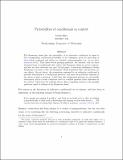Probabilities of conditionals in context
Author(s)
Khoo, Justin Donald
Download10988_2015_9182_ReferencePDF.pdf (514.5Kb)
OPEN_ACCESS_POLICY
Open Access Policy
Creative Commons Attribution-Noncommercial-Share Alike
Terms of use
Metadata
Show full item recordAbstract
The Ramseyan thesis that the probability of an indicative conditional is equal to the corresponding conditional probability of its consequent given its antecedent is both widely confirmed and subject to attested counterexamples (e.g., McGee, in Analysis 60(1):107–111, 2000; Kaufmann, in J Philos Logic 33:583–606, 2004). This raises several puzzling questions. For instance, why are there interpretations of conditionals that violate this Ramseyan thesis in certain contexts, and why are they otherwise very rare? In this paper, I raise some challenges to Stefan Kaufmann’s account of why the Ramseyan thesis sometimes fails, and motivate my own theory. On my theory, the proposition expressed by an indicative conditional is partially determined by a background partition, and hence its probability depends on the choice of such a partition. I hold that this background partition is contextually determined, and in certain conditions is set by a salient question under discussion in the context. I argue that the resulting theory offers compelling answers to the puzzling questions raised by failures of the Ramseyan thesis.
Date issued
2016-01Department
Massachusetts Institute of Technology. Department of Brain and Cognitive SciencesJournal
Linguistics and Philosophy
Publisher
Springer Netherlands
Citation
Khoo, Justin. “Probabilities of Conditionals in Context.” Linguistics and Philosophy 39.1 (2016): 1–43.
Version: Author's final manuscript
ISSN
0165-0157
1573-0549